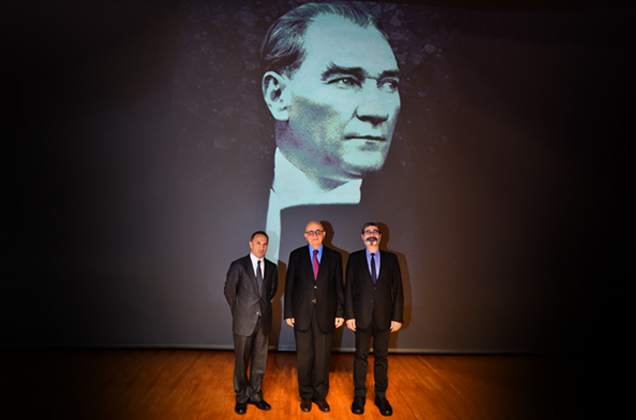19/11/2018
We remember Mustafa Kemal Atatürk, the founder of the Republic of Turkey, on the 80th anniversary of his passing.
Arts and Social Sciences Faculty Dean Özgür Kıbrıs made the opening remarks of the Atatürk Remembrance and Understanding Ceremony. Following minute silence and National Anthem, Sabancı University President Yusuf Leblebici and this year's speaker, Koç University Faculty Member Zafer Toprak took the floor.

Yusuf Leblebici began by quoting from the Sabancı University Atatürk Inscription: “My heritage is no verse, no dogma, no static and unchanging rule. My heritage is science and reason.” Yusuf Leblebici then invited Zafer Toprak to the podium to deliver his presentation “Mustafa Kemal Atatürk and Paradigm Shift: Social Sciences and Humanities in Turkey 1927-1937”.
Zafer Toprak introduced his presentation by saying that although most Atatürk biographies focused on his military and political career, Atatürk was especially influential on science after 1928, when Turkey experienced a Cultural Revolution in a sense, continuing “In this presentation, I would like to tell you the contributions Atatürk made to the world of science in the 10 years beginning with the change to the Latin script in 1928.”
Discussing Atatürk’s interest in anthropology and prehistorical archeology, the books he read on these subjects, and the contributions he made to the science, Toprak said, “Since the mid-19th century, anthropology was insisting on a secular notion of society. For Republican Turkey, anthropology was the field of science that would introduce a new understanding of society and individual. The Constitutional Monarchy was the era of Sociology, while the Republic was the era of Anthropology."
Zafer Toprak concluded, “To us, Atatürk is a great leader who built a state. He is a guide who showed a path out of dark times. We remember the founder of the Republic of Turkey, the great statesman and unprecedented leader Mustafa Kemal ATATÜRK with love, respect and longing in the 80th year of his passing.”




